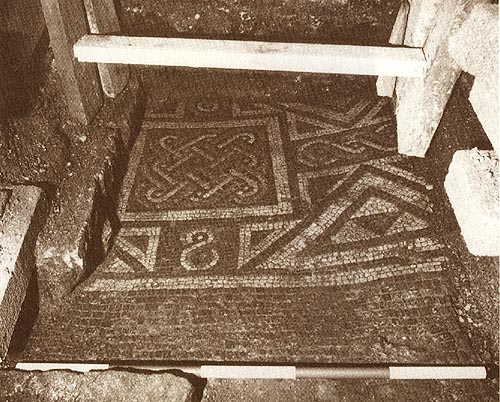King Arthur In Australia? June 15, 2011
Author: Beach Combing | in : Medieval
The Beachcombings are overjoyed as they have finally found a new aupair, an Australian tango dancer (truly). And in her honour Beach thought he would offer up today an obscure, indeed, an almost forgotten source for the Arthurian legend, a twelfth-century poem by the name of Draco Normannicus (Norman Battle Standard) with an almost impossibly […]
Churchill buries Chamberlain June 14, 2011
Author: Beach Combing | in : Contemporary
In winning the Nobel Prize for literature Winston Churchill was placed among writers of the calibre of Thomas Mann, W.B. Yeats and Rudyard Kipling. This is probably – as Churchill was the first to admit – to overstate his talents as an author: there is something to Evelyn Waugh’s bitchy description of Churchill’s ‘pseudo-Augustan prose’. […]
St Andrew and Scythia June 13, 2011
Author: Beach Combing | in : Ancient, Medieval
Patron saints have a strange habit of not coming from the countries that they are supposed to represent. England’s Saint George was Syrian, St Patrick was born not in Ireland but in Britain, Portugal’s patron saint lived all his life in northern Italy… Usually there is a logical enough explanation. St George, for instance, was […]
Unusual Riots June 12, 2011
Author: Beach Combing | in : Ancient, Contemporary, Medieval, Modern
A long day ahead of Beachcombing as the family prepare to celebrate Little Miss B’s third birthday with an uneasy coalition of villagers and local think tank wonks and the confusion of their progeny. Think Farmer Pickles talking about the price of wheat, John Balls describes the demographic replacement rate, while master Pickles and master […]
The Dauphin’s Heart June 11, 2011
Author: Beach Combing | in : Contemporary, Modern
Beachcombing is for ever rabbiting on (and on) about how time destroys memory, how everything we are told is unreliable. But the untrustworthiness of history applies not only to memory but also to objects. And what better example of this than the heart of the last dauphin, poor Louis XVII. Louis was collateral damage in […]
Druids’ Eggs June 10, 2011
Author: Beach Combing | in : Ancient, Modern
An interesting text from Pliny: (29, 3*) There is also a sort of egg, famous in the provinces of Gaul, but ignored by the Greeks. Innumerable snakes coil themselves into a ball in the summertime. Thus they make it so that it is held together by a bodily secretion and by their saliva. It is […]
Destroying Cassino June 9, 2011
Author: Beach Combing | in : ContemporaryThere is a demolition expert in all of us. After all, who doesn’t enjoy seeing something large and complex being blasted to a million smithereens? Beachcombing, certainly, finds architectural snuff movies relaxing. In the hope then of soothing his readers – with the possible exception of medievalists whose blood will run icy cold – he […]
Ancient Beliefs in Modern Egypt June 8, 2011
Author: Beach Combing | in : Ancient, Contemporary, ModernTime brings its chopper down on generation after generation, annihilating almost all memory. How little we know of our grandparents’ lives, how very little of our great grandparents’: while most people living in the west today have no idea where their great grandparents lived or, indeed, their names. Yet every so often history gives evidence […]
Cyclops Origins June 7, 2011
Author: Beach Combing | in : Ancient
Beachcombing has always had a bit of a thing about Cyclops. And who can blame him? After all, the encounter between old Round Eye and that smarty-pants pirate king from Ithica is what most children – genuine or grown – remember about the Odysseus: there is something so Roald Dahlish about the disgusting yet […]
Roman Mosaics and Bras in 1930s Leicester June 6, 2011
Author: Beach Combing | in : Ancient, Contemporary
A busy day for Beach today – the hunt for mice, newspaper columns and the ongoing search for an aupair – and so he thought that he would just quote from this 1930s guide to Roman Britain for a strange archaeological visit. Leicester, for those who don’t know it, is a rather frightening English Midland […]
The Strangest Instrument June 5, 2011
Author: Beach Combing | in : Ancient, Contemporary, Medieval, Modern
In his forlorn attempts to bring the bizarre into melody Beachcombing has done a little browsing through music-history books in the last six months. And one of the manila files that he consequently opened – now stored in the rusty filing cabinet in the downstairs bathroom – was entitled ‘weird instruments’. Beachcombing is going to […]
Animal Effigies and Indian Mounds June 4, 2011
Author: Beach Combing | in : Ancient, Medieval
Beachcombing has long been attracted to the so called ‘animal effigy mounds’ of Wisconsin, Iowa, Minnesota, Ohio and Louisiana. Across these states local Indian populations built a series of giant mounds in the shape of animals. Dating is almost impossibly difficult in such cases, but many archaeologists have placed the creation of these mounds […]
Maximilian’s Shirt June 3, 2011
Author: Beach Combing | in : Modern
‘Emperor’ Maximilian was a scion of the Hapsburg dynasty who was parachuted into Mexico (1864) as Imperial Ruler in the Old World’s last concerted attempt to meddle in the Americas. Maximilian was not quite the patsy though that many in Europe and monarchists of Mexico had hoped. He was one of those men who had […]
The Impostor June 2, 2011
Author: Beach Combing | in : Ancient, Contemporary, Medieval, ModernFor ten years a mother and son are separated – war, a prison sentence, the grand tour… – and then reunited. Only there is a problem. The son is not actually the son, but an impostor. What are the chances that the mother will be taken in? This scenario and the subsequent question appear asinine. […]
Beachcombed 12 June 1, 2011
Author: Beach Combing | in : BeachcombedDear Readers, 1 June Here is Beachcombing’s round up of exceptional emails and comments from the month of May. After a year at this game – Beach’s blogging anniversary passed a couple of days ago – he now wonders whether the comments are not of more value than the posts. After all, ten thousand words […]


